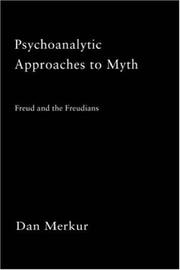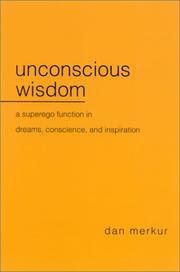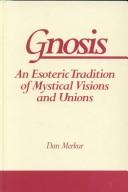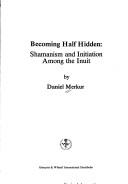| Listing 1 - 8 of 8 |
Sort by
|

ISBN: 0824059360 0415651123 1280106891 0203997247 9780203997246 9780824059361 9781280106897 9781135575236 9781135575274 9781135575281 9780415651127 Year: 2005 Publisher: New York Routledge
Abstract | Keywords | Export | Availability | Bookmark
 Loading...
Loading...Choose an application
- Reference Manager
- EndNote
- RefWorks (Direct export to RefWorks)
The book surveys and evaluates the methods that Freud and the various psychoanalytic schools have employed in their studies of myths. In addition to providing a historical survey, the author argues that modern views of myth as something to be deplored because it is inconsistent with history and science depends on a misunderstanding of the nature of myth. Myth is not a product of unconscious irrationality but is instead a sustained use of metaphor. It expresses ideas in concrete imagery of unconscious inspiration, but the ideas can be rational and profound, as is also the case with poetry and scientific models. As such, there is no validity in condescending to myth-telling cultures, as though their use of myth made them less rational or realistic than Western culture.
Myth --- Psychological aspects. --- Psychology. --- Mythology. --- Myths --- Legends --- Religion --- Religions --- Folklore --- Gods --- Demythologization --- God --- Mythology

ISBN: 0791490750 0791449475 9780791449479 0791449483 9780791449486 9780791490754 Year: 2001 Publisher: Albany State University of New York Press
Abstract | Keywords | Export | Availability | Bookmark
 Loading...
Loading...Choose an application
- Reference Manager
- EndNote
- RefWorks (Direct export to RefWorks)
In a detailed engagement with the psychoanalytic theories of dreams, conscience, empathy, and creativity, Dan Merkur argues that the superego is an unconscious reasoning process, dedicated to the representation of the loved object. The superego's access to the repressed and devotion of time to single topics make it both more knowledgeable and more intelligent than the conscious ego. This is the final installment in Merkur's three-volume exploration of the psychoanalysis of religious experiences—volumes one and two are The Ecstatic Imagination: Psychedelic Experiences and the Psychoanalysis of Self-Actualization and Mystical Moments and Unitive Thinking, also published by SUNY Press.
Superego. --- Psychoanalysis. --- Superego --- Psychoanalysis --- Dreams --- Psychoanalytic Theory --- Sleep --- Personality Development --- Imagination --- Psychological Theory --- Psychophysiology --- Psychological Phenomena and Processes --- Personality --- Cognition --- Mental Processes --- Behavior and Behavior Mechanisms --- Psychiatry and Psychology --- Psychology --- Social Sciences --- Behavior And Behavior Mechanism --- Human Information Processing --- Information Processing, Human --- Cognitive Function --- Cognitions --- Cognitive Functions --- Function, Cognitive --- Functions, Cognitive --- Personalities --- Human Characteristics --- Psychologic Processes --- Psychologic Processes and Principles --- Psychological Processes --- Phenomena, Psychological --- Processes, Psychologic --- Processes, Psychological --- Psychological Phenomenas --- Psychological Processe --- Mind-Body Relationship (Physiology) --- Physiologic Psychology --- Physiological Psychology --- Psychology, Physiologic --- Mind-Body Relations (Physiology) --- Psychology, Physiological --- Mind Body Relations (Physiology) --- Mind Body Relationship (Physiology) --- Mind-Body Relation (Physiology) --- Mind-Body Relationships (Physiology) --- Physiologic Psychologies --- Psychologies, Physiologic --- Relation, Mind-Body (Physiology) --- Relations, Mind-Body (Physiology) --- Relationship, Mind-Body (Physiology) --- Relationships, Mind-Body (Physiology) --- Psychosomatic Medicine --- Mind-Body Relations, Metaphysical --- Psychologic Theory --- Psychological Theories --- Theories, Psychological --- Theory, Psychological --- Social Cognitive Theory --- Cognitive Theories, Social --- Cognitive Theory, Social --- Psychologic Theories --- Social Cognitive Theories --- Theories, Psychologic --- Theories, Social Cognitive --- Theory, Psychologic --- Theory, Social Cognitive --- Imaginations --- Development, Personality --- Child Development --- Growth --- Sleep Habits --- Sleeping Habit --- Sleeping Habits --- Habit, Sleep --- Habit, Sleeping --- Habits, Sleep --- Habits, Sleeping --- Sleep Habit --- Sleepiness --- Superegos --- Psychoanalytical Theory --- Theory, Psychoanalytic --- Oral Character --- Character, Oral --- Characters, Oral --- Oral Characters --- Psychoanalytic Theories --- Psychoanalytical Theories --- Theories, Psychoanalytic --- Theories, Psychoanalytical --- Theory, Psychoanalytical --- Nightmares --- Dream --- Nightmare --- Psychology, Pathological --- Super-ego --- Unconscious conscience --- Conscience --- Freud, Sigmund, --- Freud, Sigmund

ISBN: 0585057427 9780585057422 0791416194 0791416208 9780791416198 9780791416204 9781438412863 143841286X Year: 1993 Publisher: Albany, N.Y. State University of New York Press
Abstract | Keywords | Export | Availability | Bookmark
 Loading...
Loading...Choose an application
- Reference Manager
- EndNote
- RefWorks (Direct export to RefWorks)
Visions --- Mysticism --- Gnosticism --- Imagination --- Psychoanalysis and religion. --- Psychoanalysis and religion --- Social Sciences --- Parapsychology & Occult Sciences --- Religion and psychoanalysis --- Religion --- Parapsychology --- Visionaries --- Imagery, Mental --- Images, Mental --- Mental imagery --- Mental images --- Educational psychology --- Intellect --- Psychology --- Reproduction (Psychology) --- History. --- History --- Jung, C. G. --- Jung, Karl Gustav, --- I︠U︡nh, Karl Hustav, --- Jung, Carl Gustav, --- Yung, Ḳ. G. --- Yungu, C. G. --- I︠U︡ng, Karl Gustav, --- יונג, קרל גוסטאב --- יונג, קרל גוסטב --- יונג, ק. ג. --- 榮格, --- C. G. ユング, --- Yūng, Kārl Gustāv, --- يونگ، کارل گستاو --- Jung, Carl Gustav
Book
ISBN: 9042028602 9789042028609 9789042028593 9042028599 Year: 2010 Publisher: Amsterdam New York, NY Rodopi
Abstract | Keywords | Export | Availability | Bookmark
 Loading...
Loading...Choose an application
- Reference Manager
- EndNote
- RefWorks (Direct export to RefWorks)
Little discussed by psychoanalysts and almost unknown outside the profession, a small but distinguished group of psychoanalysts were or are mystics: Otto Rank, Erich Fromm, Marion Milner, D. W. Winnicott, Heinz Kohut, Hans W. Loewald, Wilfred R. Bion, James S. Grotstein, Neville Symington, and Michael Eigen. All favoured an extrovertive mysticism that perceives unity throughout physical reality. Several saw creativity as an application of mystical consciousness to the physical material of artwork, artefact, or, more generally, culture.
Psychoanalysis and religion. --- Mysticism. --- Psychoanalytic interpretation.
Book
ISBN: 0815307837 Year: 1992 Publisher: Hamden Garland
Abstract | Keywords | Export | Availability | Bookmark
 Loading...
Loading...Choose an application
- Reference Manager
- EndNote
- RefWorks (Direct export to RefWorks)
Book
ISBN: 1438427441 1441629718 9781441629715 143842745X 9781438427454 9781438427447 9781438427454 9781438427447 Year: 2009 Publisher: Albany SUNY Press
Abstract | Keywords | Export | Availability | Bookmark
 Loading...
Loading...Choose an application
- Reference Manager
- EndNote
- RefWorks (Direct export to RefWorks)
Is Moses Maimonides an unacknowledged ancestor of the psychoanalytic movement? In this book, David Bakan, Dan Merkur, and David S. Weiss look at the great medieval Jewish philosopher's prescription for the cure of souls and its psychological significance. In the Guide of the Perplexed, Maimonides, who was also a physician, describes the soul's illness: when sinners rationalize evil as good, they limit their capacities to reason, imagine, and behave well, which also produces physical symptoms. The cure depends on repentance in love and fear of God that is attained through philosophical knowledge, the interpretation of dreams and visions, and mystical contemplation. The authors look at the Aristotelian background of Maimonides' psychology, Maimonidean mysticism, his beliefs about prophecy and sexuality, and what is known of Maimonides' client population. A final chapter discusses Maimonides and Freud, noting that many distinctive features of the cure of souls are shared by Freud's original formulation of psychoanalysis. Indeed, the many points of convergence suggest Freud's direct or indirect contact with Maimonides' legacy.
Prophecy --- Meditation --- Soul --- Psychotherapy --- Judaism and psychoanalysis. --- Meditation (Judaism) --- Soul (Judaism) --- Psychoanalysis and Judaism --- Psychoanalysis --- Judaism. --- Religious aspects --- Maimonides, Moses,

ISBN: 9789122007524 9122007520 Year: 1985 Publisher: Stockholm: Almqvist och Wiksell,
Abstract | Keywords | Export | Availability | Bookmark
 Loading...
Loading...Choose an application
- Reference Manager
- EndNote
- RefWorks (Direct export to RefWorks)
Book

ISBN: 9782872992010 2872992014 Year: 2011 Volume: 13 Publisher: Bruxelles: Lessius,
Abstract | Keywords | Export | Availability | Bookmark
 Loading...
Loading...Choose an application
- Reference Manager
- EndNote
- RefWorks (Direct export to RefWorks)
Islam --- Comparative religion --- Christian spirituality --- Jewish religion --- C1 --- boeddhisme --- christendom --- islam --- Kerken en religie --- Mysticism --- Comparative studies --- Cross-cultural studies
| Listing 1 - 8 of 8 |
Sort by
|

 Search
Search Feedback
Feedback About UniCat
About UniCat  Help
Help News
News